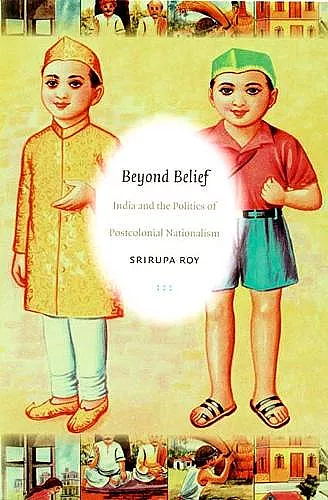Beyond Belief
India and the Politics of Postcolonial Nationalism
Format:Hardback
Publisher:Duke University Press
Published:28th May '07
Currently unavailable, and unfortunately no date known when it will be back

Examines the formation of the nation-state in postcolonial India, how it worked to create an identity for itself, to what extent it succeeded, and what may be the prospects for unity in a widely diverse country
Analyzing India during the first two decades following its foundation as a sovereign nation-state in 1947, this title explores how nationalists are turned into nationals, the colonial state into a sovereign nation-state, and subjects into citizens.Beyond Belief is a bold rethinking of the formation and consolidation of nation-state ideologies. Analyzing India during the first two decades following its foundation as a sovereign nation-state in 1947, Srirupa Roy explores how nationalists are turned into nationals, subjects into citizens, and the colonial state into a sovereign nation-state. Roy argues that the postcolonial nation-state is consolidated not, as many have asserted, by efforts to imagine a shared cultural community, but rather by the production of a recognizable and authoritative identity for the state. This project—of making the state the entity identified as the nation’s authoritative representative—emphasizes the natural cultural diversity of the nation and upholds the state as the sole unifier or manager of the “naturally” fragmented nation; the state is unified through diversity.
Roy considers several different ways that identification with the Indian nation-state was produced and consolidated during the 1950s and 1960s. She looks at how the Films Division of India, a state-owned documentary and newsreel production agency, allowed national audiences to “see the state”; how the “unity in diversity” formation of nationhood was reinforced in commemorations of India’s annual Republic Day; and how the government produced a policy discourse claiming that scientific development was the ultimate national need and the most pressing priority for the state to address. She also analyzes the fate of the steel towns—industrial townships built to house the workers of nationalized steel plants—which were upheld as the exemplary national spaces of the new India. By prioritizing the role of actual manifestations of and encounters with the state, Roy moves beyond theories of nationalism and state formation based on collective belief.
“Srirupa Roy offers fresh, innovative, and highly original perspectives on how the Indian nation-state set out to manufacture a national modernity and new ways of presenting itself. This is a much needed contribution to a critical assessment of the now quasi-mythical Nehruvian decades of postcolonial state formation from one of the best political scientists writing on India today.”—Thomas Blom Hansen, University of Amsterdam
“This book marks a departure in the study of Indian nationalism. Srirupa Roy’s idea that nationalism works not as a ‘belief’ but through practices that seek to ground the state deeply in the life of the people, is demonstrated here by archival and ethnographic explorations of specific sites: rituals and pageantry of the state, official newsreels and documentaries, planned scientific institutions and industrial cities. The result is fine-grained political analysis enriched at every turn by the author’s judicious use of history and ethnography.”—Dipesh Chakrabarty, author of Habitations of Modernity: Essays in the Wake of Subaltern Studies
“Srirupa Roy . . . has written an engaging and incisive study of the nation-building project in India. . . . Roy’s book is a welcome and original investigation into the origin and means of the national imagination of India.” -- Simona Vittorini * Studies in Ethnicity and Nationalism *
“Srirupa Roy’s Beyond Belief is a superb contribution to the study of postcolonial nationalism and the complex lives of the postcolonial Indian nation-state. . . . [T]he book is an excellent and invaluable addition to the literature on Indian nationalism and the Indian nation-state as well as an important contribution to theories of nationalism, the state, and nation-state, and postcolonial studies. Lucid and concise, the book is extremely well written. Different methodological and disciplinary perspectives are employed in the text with rigor and carefulness to enrich one another.” -- Rohit Chopra * H-Nationalism, H-Net Reviews *
ISBN: 9780822339847
Dimensions: unknown
Weight: 517g
264 pages